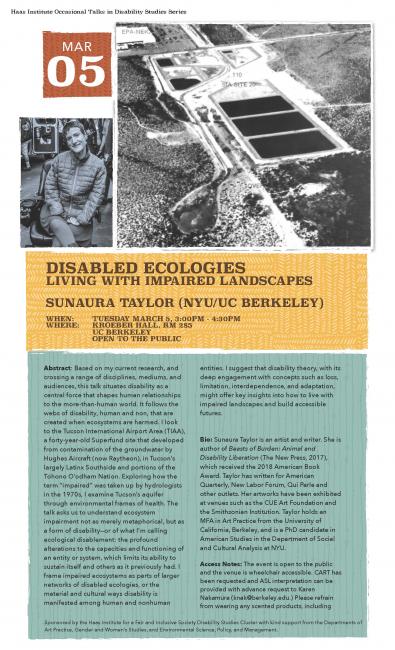WHEN: TUESDAY MARCH 5, 3:00PM - 4:30PM
WHERE: KROEBER HALL, RM 285
UC BERKELEY
OPEN TO THE PUBLIC
Abstract: Based on my current research, and crossing a range of disciplines, mediums, and audiences, this talk situates disability as a central force that shapes human relationships to the more-than-human world. It follows the webs of disability, human and non, that are created when ecosystems are harmed. I look to the Tucson International Airport Area (TIAA), a forty-year-old Superfund site that developed from contamination of the groundwater by Hughes Aircraft (now Raytheon), in Tucson’s largely Latinx Southside and portions of the Tohono O’odham Nation. Exploring how the term “impaired” was taken up by hydrologists in the 1970s, I examine Tucson’s aquifer through environmental frames of health. The talk asks us to understand ecosystem impairment not as merely metaphorical, but as a form of disability—or of what I’m calling ecological disablement: the profound alterations to the capacities and functioning of an entity or system, which limits its ability to sustain itself and others as it previously had. I frame impaired ecosystems as parts of larger networks of disabled ecologies, or the material and cultural ways disability is manifested among human and nonhuman entities. I suggest that disability theory, with its deep engagement with concepts such as loss, limitation, interdependence, and adaptation, might offer key insights into how to live with impaired landscapes and build accessible futures.
Bio: Sunaura Taylor is an artist and writer. She is author of Beasts of Burden: Animal and Disability Liberation (The New Press, 2017), which received the 2018 American Book Award. Taylor has written for American Quarterly, New Labor Forum, Qui Parle and other outlets. Her artworks have been exhibited at venues such as the CUE Art Foundation and the Smithsonian Institution. Taylor holds an MFA in Art Practice from the University of California, Berkeley, and is a PhD candidate in American Studies in the Department of Social and Cultural Analysis at NYU.
Access Notes: The event is open to the public and the venue is wheelchair accessible. CART has been requested and ASL interpretation can be provided with advance request to Karen Nakamura (knak@berkeley.edu.) Please refrain from wearing any scented products.
Sponsored by the Haas Institute for a Fair and Inclusive Society Disability Studies Cluster with kind support from the Departments of Art Practice, Gender and Women’s Studies, and Environmental Science, Policy, and Management.





